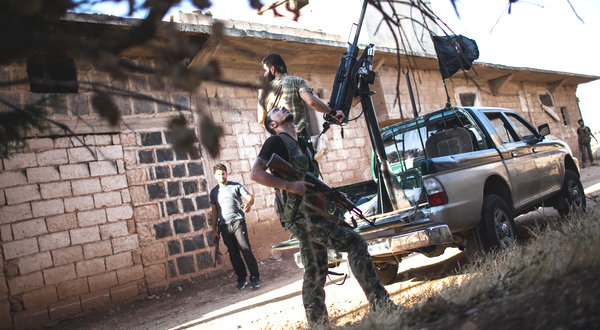Over the weekend, the United States and Turkey discussed a variety of measures to aid the opposition to President Bashar al-Assad, including a no-fly zone, though no decisions were reached.
While the fighting raged in Aleppo, Syria’s largest city, the Syrian authorities on Sunday reported two bomb attacks in Damascus, the capital.
The bombings occurred in the Marjeh district of Damascus, suggesting the rebels were still active in the capital and were increasingly turning to explosives in their evolving guerrilla campaign. Last week, a bomb tore through Syria’s state television headquarters; a month ago, an explosion killed four senior military and intelligence officials.
No one was wounded in the attacks on Sunday, Syria’s state news agency said. The first blast was set off remotely as soldiers passed by in a vehicle. The device was hidden under a tree about 100 yards from the Four Seasons Hotel in Damascus, The Associated Press reported.
The second blast went off around the same time near a soccer stadium half a mile away. Both explosions were followed by gunfire “to provoke panic,” the authorities said.
Also on Sunday, Al Arabiya, an Arabic news channel, reported that a journalist working with it was killed on Saturday by a bomb in a suburb north of Damascus. The journalist, Bara’a Yusuf al-Bushi, was a defector from the Syrian Army who worked with several international news organizations. Syria’s state news agency said Sunday that one of its journalists had also been killed, a day after reporting that, in a separate episode, rebels had kidnapped the members of one of its television news crews.
The weekend’s events highlighted the risks that journalists in Syria face as the government tries to limit access and as the rebels and Mr. Assad’s government put a premium on propaganda. Over the course of the war, there have often been conflicting accounts of events, most of them difficult to verify independently.
This year, the Committee to Protect Journalists identified Syria as the third “most censored” country in the world, just behind North Korea.
More recently, the number of foreign reporters entering the country has increased, and news agencies like Reuters have found ways to establish what seems to be a full-time local presence. But as that presence has expanded, so have the risks. Several reporters moving in and out of Aleppo have recently described close calls as the Syrian military has shelled the city and, lately, attacked it with fighter jets.
Opposition leaders said Sunday that despite reports that their fighters were running low on arms and ammunition, they would continue to fight. Clashes erupted in several areas in and around Aleppo on Sunday, with attacks from fighter jets, as the war for the city edged into its third week.
There were also skirmishes and shelling in Damascus, activists said, where fighting has also intensified in the past few days.
And in a video released on Sunday, one of the rebel brigades in the capital said that Syrian troops had launched two attacks in an effort to free dozens of Iranians kidnapped by the brigade last week. Iran says the captives are pilgrims who were in Damascus to visit a Shiite shrine, but the rebels say their hostages (45 are left after three were killed by shelling) are Iranian agents.
In the video, the brigade’s commander said that the government would have to end its siege of rebel-controlled areas before the opposition would negotiate over the release of the captives.
The Arab League postponed a meeting on Syria scheduled for Sunday. An official told Reuters that it had to be rescheduled because Saudi Arabia’s foreign minister, Prince Saud al-Faisal, required surgery.
